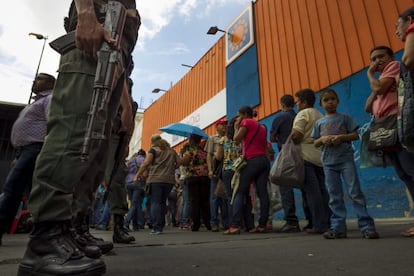Venezuelan authorities close in on private sector
President Maduro accuses businessmen of trying to oust him from office

The president of the Association of Clinics and Hospitals in Venezuela recently warned in a television interview about the shortages of medicine and medical equipment across the country.
“There is a 60 to 70 percent shortage of medicines, and half the equipment is unusable because there are no spare parts. Patients with chronic diseases are not following their treatments and run the risk of serious complications,” said Doctor Carlos Rosales last Wednesday.
Two days later, he was detained by the country’s Sebin intelligence service at his home in Valencia. He was released with a warning: don’t use expressions “that could cause alarm among the population.”
Businessmen will now fill up the lists of political prisoners in Venezuela” Jorge Roig, president of Fedecámeras
At first, it was feared that Rosales had met the same fate as two other businessmen – Pedro Luis Angarita, the president of pharmacy chain Farmatodo, and Manuel Morales, director of Día a Día supermarkets – who are facing criminal charges related to destabilizing the Venezuelan economy.
The three cases demonstrate how far the Venezuelan government has gone in blaming the private sector for the painful shortages that have plagued the country for nearly two years.
“Businessmen will now fill up the lists of political prisoners in Venezuela,” wrote Jorge Roig, president of Fedecámeras, which groups business associations across the country, on his Twitter account.
At the start of a critical year for the government, the Maduro administration has decided to attack the consequences of Venezuela’s mixed economic policies instead of trying to restructure the model.
The biggest result of the government’s disastrous policies are the long lines at supermarkets and other places that sell subsidized products that are imported or produced locally in ever smaller quantities.
Last month, President Nicolás Maduro blamed the lines and shortages on store owners and businessmen, saying they were part of a larger plan to oust him from office.
By trying to keep the value of the bolívar currency from devaluating even further, the Maduro government has ordered suppliers to sell their products at regulated prices without taking into account inflation, which has risen to 63 percent in a year.
Supermarket chain Día a Día has become a victim of Maduro’s war on speculators. With 35 small stores in 16 cities across Venezuela, Día a Día sells small kits of basic food items to the nation’s low-income sectors.
The powerful marketing idea was conceived by Morales, who is now in jail awaiting trial, and his partner José Vicente Aguerrevere, who is in the United States.
Aguerrevere questions why his partner is facing economic charges if the government has carefully authorized and monitored the deliveries of all products from the firm’s warehouse to its stores by means of a system set up to keep track of the flow of consumer goods in the country.
Maduro has now ordered state-company Pdval to control the stock at Día a Día, but has not said if this is a temporary measure or if he plans on expropriating the entire chain.
Tu suscripción se está usando en otro dispositivo
¿Quieres añadir otro usuario a tu suscripción?
Si continúas leyendo en este dispositivo, no se podrá leer en el otro.
FlechaTu suscripción se está usando en otro dispositivo y solo puedes acceder a EL PAÍS desde un dispositivo a la vez.
Si quieres compartir tu cuenta, cambia tu suscripción a la modalidad Premium, así podrás añadir otro usuario. Cada uno accederá con su propia cuenta de email, lo que os permitirá personalizar vuestra experiencia en EL PAÍS.
¿Tienes una suscripción de empresa? Accede aquí para contratar más cuentas.
En el caso de no saber quién está usando tu cuenta, te recomendamos cambiar tu contraseña aquí.
Si decides continuar compartiendo tu cuenta, este mensaje se mostrará en tu dispositivo y en el de la otra persona que está usando tu cuenta de forma indefinida, afectando a tu experiencia de lectura. Puedes consultar aquí los términos y condiciones de la suscripción digital.








































